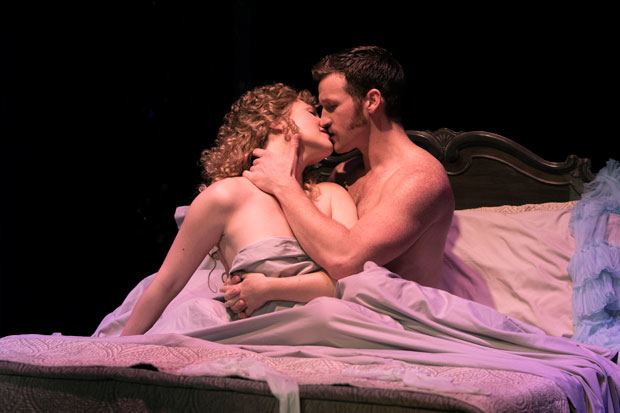A Love Triangle Ignites in Passion

(© Margot Schulman)
Stephen Sondheim's lush, melodramatic meditation on love sweeps back onto the stage at Signature Theatre. Passion, with music and lyrics by Sondheim and book by James Lapine, premiered on Broadway in 1994 and made its D.C.-area debut two years later at Signature. This regional return is a very welcome and ambitious start to the theater's 2018-19 season. Passion is a vocally and emotionally challenging show, and Signature's production manages to succeed greatly on both fronts.
The musical, set in 1863, begins with two lovers, Giorgio (Claybourne Elder) and Clara (Steffanie Leigh), rolling around on a bed in a pure rapturous embrace. All they can speak and sing of is their overwhelming love for each other and how fortunate they feel. This bliss is cut short by the news that Giorgio must leave their cozy bed in Milan to be stationed as an army captain in a dreary, remote village. The two lovers promise to write each other, and it's through this romantic epistolary exchange that Giorgio manages to float above the depressing circumstances of his new military post.
Unlike the well-read Giorgio, his fellow comrades are complete dolts, obsessed only with petty gossip, women, and drink. There's also the morose matter of the cousin of Giorgio's colonel, Fosca (Natascia Diaz), a young woman aged by a mysterious illness who possesses an irreparable broken heart and soul. Giorgio takes pity on Fosca, and the two develop a bond over their mutual love of literature, but he soon comes to regret it as she becomes infatuated with him. Giorgio then falls into his own personal battle between the lightness of his love for Clara and the depths of Fosca's need for him.
While most of Passion rests on the shoulders of Elder's Giorgio as the musical's protagonist, it's Diaz's Fosca that carries the true weight of the production. While Fosca is derided by most of the other male characters as ugly and unappealing, Diaz as Fosca is so captivating that it's impossible to look away from her whenever she's onstage. Diaz plays the sickly Fosca with such a weakness of body and a force of spirit that it's a revelation to watch. The control she has within her body and voice is masterful. She brings out Fosca's dry sense of humor to breathe brief moments of relief into her demanding performance. Elder's Giorgio is handsome and stoic for most of the show, but his transformative understanding of love through Clara and Fosca is beautiful and subtle. Leigh's Clara is luminous. Her voice and bearing onstage is stunning and her dreamy interludes amid the emotional tumult of Giorgio and Fosca provide sweet relief.
The look of Passion is simple and modest. Scenic designer Lee Savage has created two opposing balconies onstage. Clara is presented on her balcony for several of the letter-reading moments in the show, giving off a Romeo and Juliet vibe. A spiral staircase and landing into Fosca's world could have been utilized better to contrast the two women. A few choice props, including a bed, table, and desk, are utilized in multiple scenes. This spare set allows director Matthew Gardiner (Signature's associate artistic director) to focus the high dramatics on the actors, giving their voices room to fill the space. Costume designer Robert Perdziola further showcases the actors. Clara's dresses are frothy and romantic, while Fosca's well-worn black frock is puritanical, outside of a sartorial moment where she wears a deep-purple-and-black gown that projects a really clever attempt to show her version of hopeful glamour.
Passion is based on both Iginio Ugo Tarchetti's 1869 novel Fosca and a 1981 film adaptation, Passione d'Amore. Sondheim and Lapine's stage version sometimes feels like a lofty opera (and there are some operatic moments that get mocked in a cheeky way by various characters) and many times like a grounded commentary on love. This complicated balance of a soaring romantic story that comes crashing down is what Sondheim and Lapine do best. Sondheim's lyrics are deeply haunting and felt in this musical, especially when Fosca draws Giorgio under a sort of spell with the line "They hear drums while we hear music." It perfectly encapsulates their souls and their separation from the society in which they live.
Signature's Passion is a production that is full of its title's chief emotion. It doesn't miss the winking, dark humor of a Sondheim show while also being mired in true intensity, adding up to an experience that churns in the minds and rattles the souls of its audience in a way that feels very much like love.










